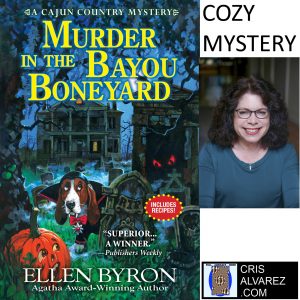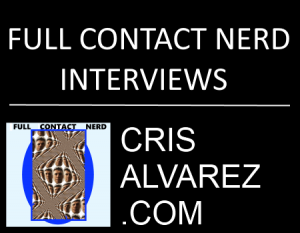Ellen Byron discusses her cozy mystery novel “Murder in the Bayou Boneyard” – (Crooked Lane Books, 2020)
 Cozy Mystery – An interview with Ellen Byron about her new book Murder in the Bayou Boneyard published by Crooked lane Books. Check out the book here https://amzn.to/2ErBjLe
Cozy Mystery – An interview with Ellen Byron about her new book Murder in the Bayou Boneyard published by Crooked lane Books. Check out the book here https://amzn.to/2ErBjLe
Of all the creative ideas you have, how did this one idea rise about the rest and get written?
I realized that I hadn’t written a Cajun Country Mystery that revolved around Halloween. Considering that Louisiana proudly bills itself as the most haunted state in the country, it seemed like a gimme – although my storyline doesn’t really revolve around a haunting. Still, it incorporates some legends and superstitions specific to Louisiana.
What is the book about – protagonist, setting, and conflict?
To fight back against a home-share app that’s stealing guests from the local B&B’s, protagonist Maggie Crozat comes up with a marketing scheme that will attract Halloween-loving visitors. The “Pelican’s Spooky Past” packages feature uniquely regional activities like Resurrection of the Spirit, a play that will be presented in a derelict Louisiana cemetery. The Crozat family also times the opening of their long-awaited spa to the kick-off of the “Spooky Past” weekends at their Crozat Plantation B&B. Maggie has hired Susannah Crozat MacDowell, a long-lost Canadian cousin as the spa’s masseuse. But relations between the opposing Crozats take a dangerous turn when Susannah claims rights to some of Crozat Plantation B&B’s land. Meanwhile, guests at all the B&Bs are being scared off by sightings of a rougarou, the legendary Cajun Country creature who is a cross between a werewolf and vampire. When the play theatrics turn deadly, Maggie Crozat begins to fear that “Pelican’s Spooky Past” is nothing compared to its scary present.
What sort of aesthetic does the book have?
It’s got humor and heart, with a touch of the spooky!
If the book had a soundtrack, what might it be like?
A combination of silly music – like “Monster Mash” – fun music – the entire soundtrack from “Rocky Horror Picture Show” – and some genuinely ominous music, such as Camille Saint-Saens’ “La Danse Macabre.”
Did you have to do any research for the book?
Yes. I really delved into the Cajun legend of the rougarou. I also did the St. Joseph Plantation Creole Mourning Tour, where I learned a ton about 19th century funereal customs and superstitions that I wrote into the book. I actually wrote a blog post about the tour that the site liked so much, they put it on their website. https://www.stjosephplantation.com/2017/11/mourning-tour-review/
What were some of the strangest things you learned on the St. Joseph Plantation Creole Mourning Tour?
I think everything that had to do with superstitions about the spirits looking for ways to mark the next soul for death. For example, the deceased were loaded into the horse-drawn hearse feet-first so that the spirits couldn’t make eye contact with the mourners – thus dooming them – and every mirror was covered with black cloth because shiny surfaces attracted spirits. I always thought mirrors were covered in black out of respect for the dead. I had no idea it was to “protect” the living from being dragged into the next world!
Do you recall any abandoned places that you’ve seen in person or in pictures that gave you the most intense chills?
When I was in high school, I cut class – shh, don’t tell – to go explore a “haunted house” with some classmates. It was a gorgeous old estate located on the Westchester County side of the Long Island Sound, straight out of F. Scott Fitgerald’s The Great Gatsby. I was terrified wandering through its abandoned rooms, made spookier by the fact that its last incarnation had been as a religious retreat, so there were little ceramic fonts and crosses everywhere. I was both fascinated and utterly terrified. A few years later, still obsessed by the place, I went to see it again, but it had been torn down and replaced by ugly McMansions. I was so sad because my hope was that someone with deep pockets had bought the stunning home and restored it to its former glory.
What are some of the genre works that inspire you – books, movies, tv, music, etc.
I love historical mysteries. They might be my favorite general genre. I’m inspired by the Brontes and Dame Agatha, of course. When it comes to TV, great comedy or drama inspire me. Recent examples include Mad Men (my dad was a genuine Mad Man, so it’s very personal to me) and Succession, as well as Veep. All three of these shows are just spectacularly written. With movies, my favorite three are a diverse lot: The Producers, The Haunting, and Amarcord. Seriously, could there be three more different films?!
When it comes to music, what inspires me is also an odd mix. I adore disco – I think KC and the Sunshine Band is the best band on the planet, and no one will ever convince me otherwise! And I also love Zydeco, Cajun music… and Bollywood. Like I said, an odd mix. For me, music is what you dance to, so I love music that makes me want to leap to my feet.
What other things inspire your creativity?
I’m obviously fascinated with Cajun Country and can’t read enough about it. I’m also obsessed with abandoned places. I can scroll through those photos for hours. And I collect vintage cookbooks. I love the look of them, and also learning what constitutes popular food in a given decade. Sometimes an old recipe will inspire a new one for either of my series. (I also write The Catering Hall Mysteries under the pen name, Maria DiRico.)
What is your writing and editing process like? Anything different from other authors?
I outline as much as I can. I call it a fluid outline because entire new characters or chapters or even subplots may pop up as I write the actual job. I attribute my predilection to outline to my career as a TV writer. I think that’s what makes me different from other authors. Not many come to writing books from a twenty-plus year career as a TV writer-producer.
How has your approach to writing changed over time?
It’s become more articulated in that I can break my process down into steps. I actually created a workshop on how to outline that I have yet to teach, thanks to the pandemic.
Have you done any non-writing work that has influenced how you write or what you write about?
Yes! I spent ten years as a member of two improvisation troops that performed a form of improv known as Theatresports. I learned to say “yes and” to ideas. Much of what I learned through Theatresports finds it way into my writing, like asking the question “What Happens Next?” and applying it to my work moment to moment.
Do you ever act out scenes in your books as you’re writing a draft to see if they work in the story?
I sometimes read a scene aloud but even though my background is in acting – I did comedy improv for years – I’m not one of those people who reads their entire book out loud. I find my focus is too divided to do this successfully. My acting and playwriting background allow me to hear my book in my head well enough to determine whether or not something is working.
When you were younger was there a power, technology, or fictional setting you yearned for or to be a part of?
It’s a real setting applied to a fictional book – ever since I first read Wuthering Heights as a teenager, I’ve dreamt of visiting the Bronte Parsonage and walking the moors the Bronte sisters once walked.
Have you ever visited any moors especially haunted ones?
Not yet, but the number one item on my bucket list is to visit the Bronte parsonage and walk the moors where Emily, Charlotte and Anne once walked. I dream of running into the ghost of any of them!
Did you have any difficulties finishing this book?
Only the usual trouble a writer has of preventing themselves from wandering over to social media instead of writing!
What’s your current or next writing project?
LONG ISLAND ICED TINA, the next book in my Catering Hall Mystery series, releases on February 25, 2021. And I’m working on my seventh Cajun Country Mystery, which doesn’t have a definite title yet.
Where can people find you online?
Newsletter: https://www.ellenbyron.com/
Facebook:
https://www.facebook.com/ellenbyronauthor/
Instagram:
https://www.instagram.com/ellenbyronmariadirico/
Bookbub:
https://www.bookbub.com/profile/ellen-byron
Goodreads:
https://www.goodreads.com/author/show/23234.Ellen_Byron?from_search=true&from_srp=true
Links of interest
Check out the book here https://amzn.to/2ErBjLe
https://www.penguinrandomhouse.com/books/647531/murder-in-the-bayou-boneyard-by-ellen-byron/
As an Amazon Associate I earn from qualifying purchases.
 How a fantasy author made the successful switch to science fiction with Adrian Tchaikovsky
How a fantasy author made the successful switch to science fiction with Adrian Tchaikovsky















